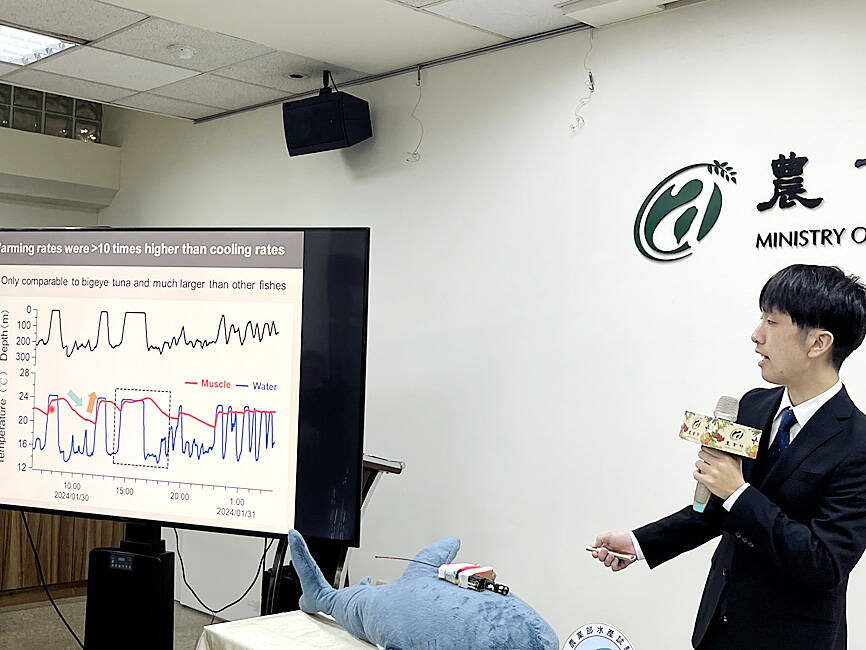Taiwan’s Fisheries Research Institute (FRI), in collaboration with local and Japanese universities, presented its findings on the behavioral characteristics and thermoregulation mechanisms of the shortfin mako shark on Monday.
The species of shark, classified as “endangered” by the International Union for Conservation of Nature, is one of the most common bycatches of Taiwanese commercial longline and gillnet fisheries, the FRI told a news conference.
The joint research was carried out by FRI in conjunction with Japan’s Graduate University for Advanced Studies (SOKENDAI) and National Kaohsiung University of Science and Technology.

Photo: CNA
According to SOKENDAI professor Yuki Watanabe, Taiwanese and Japanese fishers have helped to capture shortfin mako sharks and tag them with custom-made data loggers, which transmitted the data via satellite.
The loggers, which capture video recordings, monitored the sharks’ body temperatures and tracked their movements, SOKENDAI researcher Soma Tokunaga said.
Analysis of the data revealed the unique thermoregulation abilities of the shortfin mako that are not found in other shark species, one of which is the ability to regulate body temperature so that it stays warmer than the surrounding water, Tokunaga said.
When hunting prey even at depths of 1km where water temperatures are as low as 4°C to 5°C, the shark can use this ability to its advantage.
FRI Deputy Director-General Yeh Hsin-ming (葉信明) said the research also shows that the shortfin mako experiences only a slight decrease in body temperature averaging about 2°C to 4°C after each deep dive of several hundred meters.
This is vastly different to other types of shark, which typically keep themselves warm through a “countercurrent heat exchange,” where blood vessels transfer surrounding heat into the body, Yeh said.
The study found that during the day, the shortfin mako shark could be found in areas from the surface to depths of 300m and frequently crosses the thermocline, likely related to feeding behavior, FRI associate researcher Chiang Wei-chuan (江偉全) said.
At night, it prefers to inhabit depths of between 100m and 200m, Chiang added.
SOKENDAI is working on a report to publish the findings in international journals, Yeh said, adding that the research would also be presented at a scientific conference next month.
The research would serve as a useful resource for regional fisheries management organizations and others for research into the sustainability of the species, he said.
With climate change leading to variations in sea surface temperatures, the shortfin mako shark’s activity would also change, and as such, the findings could provide valuable insights for fisheries management, Tokunaga said.

A year-long renovation of Taipei’s Bangka Park (艋舺公園) began yesterday, as city workers fenced off the site and cleared out belongings left by homeless residents who had been living there. Despite protests from displaced residents, a city official defended the government’s relocation efforts, saying transitional housing has been offered. The renovation of the park in Taipei’s Wanhua District (萬華), near Longshan Temple (龍山寺), began at 9am yesterday, as about 20 homeless people packed their belongings and left after being asked to move by city personnel. Among them was a 90-year-old woman surnamed Wang (王), who last week said that she had no plans

China might accelerate its strategic actions toward Taiwan, the South China Sea and across the first island chain, after the US officially entered a military conflict with Iran, as Beijing would perceive Washington as incapable of fighting a two-front war, a military expert said yesterday. The US’ ongoing conflict with Iran is not merely an act of retaliation or a “delaying tactic,” but a strategic military campaign aimed at dismantling Tehran’s nuclear capabilities and reshaping the regional order in the Middle East, said National Defense University distinguished adjunct lecturer Holmes Liao (廖宏祥), former McDonnell Douglas Aerospace representative in Taiwan. If

TO BE APPEALED: The environment ministry said coal reduction goals had to be reached within two months, which was against the principle of legitimate expectation The Taipei High Administrative Court on Thursday ruled in favor of the Taichung Environmental Protection Bureau in its administrative litigation against the Ministry of Environment for the rescission of a NT$18 million fine (US$609,570) imposed by the bureau on the Taichung Power Plant in 2019 for alleged excess coal power generation. The bureau in November 2019 revised what it said was a “slip of the pen” in the text of the operating permit granted to the plant — which is run by Taiwan Power Co (Taipower) — in October 2017. The permit originally read: “reduce coal use by 40 percent from Jan.

‘SPEY’ REACTION: Beijing said its Eastern Theater Command ‘organized troops to monitor and guard the entire process’ of a Taiwan Strait transit China sent 74 warplanes toward Taiwan between late Thursday and early yesterday, 61 of which crossed the median line in the Taiwan Strait. It was not clear why so many planes were scrambled, said the Ministry of National Defense, which tabulated the flights. The aircraft were sent in two separate tranches, the ministry said. The Ministry of Foreign Affairs on Thursday “confirmed and welcomed” a transit by the British Royal Navy’s HMS Spey, a River-class offshore patrol vessel, through the Taiwan Strait a day earlier. The ship’s transit “once again [reaffirmed the Strait’s] status as international waters,” the foreign ministry said. “Such transits by